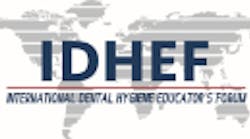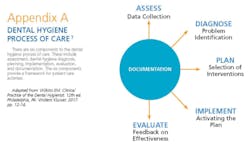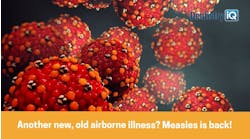By Maria Perno Goldie, RDH, MS
The third International Dental Hygiene Educator’s Forum was hosted on March 17 in Long Beach, Calif., prior to the American Dental Education Association (ADEA) meeting. The meeting was created by Sylvia Fresmann, DH, and Maria Perno Goldie, RDH, MS. More than 65 attendees, speakers, and sponsors from the United States, Canada, Portugal, Australia, Germany, and Japan participated in the forum.
Marion C. Manski, RDH, MS, spoke about Preparing Dental Hygiene Students to Address the National HIV/AIDS Strategy through an Interprofessional Curricular Approach. Marion is the associate professor and director at the Dental Hygiene Department of Endodontics, Periodontics and Prosthodontics at the University of Maryland (UM) School of Dentistry.
Marion discussed the impact of the dental hygiene student’s experience with the addition of interprofessional education (IPE) added to the curriculum. IPE is when students from two or more professions in health and social care learn together during all or part of their professional training with the object of cultivating collaborative practice for providing client- or patient-centered health care.
Marion shared that IPE allows a more focused, coordinated response to care. She gave a history of the human immunodeficiency virus (HIV), discussed advances in treatment, and mentioned that many living with HIV lead long productive lives with this chronic disease.
Public health is a primary role for the dental hygienist. Dental hygienists are perfectly positioned to administer HIV testing in the dental environment, and well educated to screen, assess, plan, and implement treatment needs. UM’s program provides a comprehensive and innovative approach to IPE by training dental hygienists for four hours on the use of OraQuick Rapid HIV-1/2 Antibody Oral Diagnostic for HIV testing. There are also interdisciplinary case conferences and other learning opportunities.
Having completed the Preparing the Future Program (PTF), students feel more comfortable offering patients HIV tests and results. The beauty of the program is that other disciplines learned about the dental hygiene profession, and gained insight regarding primary providers with a preventive focus. These students recognized how oral conditions manifested orally in HIV patients, as well as how oral health influences systemic well-being. Dental hygiene students became more aware of the roles each discipline plays in assisting HIV patients, including medical interventions, case management, and legal support. A win-win for everyone!
Rebecca Wilder, RDH, MS, delivered a presentation on: “What Editors Want: Successful Submission to a Peer Reviewed Scientific Journal.” Rebecca addressed the types of publications, such as a letter to the editor, review of the literature, systematic review, research article, etc. She shared tips for manuscript preparation, and emphasized the importance of a reference managing system such as Endnote (www.Endnote.com) or Mendeley (www.mendeley.com).
Rebecca shared many tips. Always read the author guidelines, and pay particular attention to the formatting style required to cite sources, such as American Psychological Association (APA), Modern Language Association (MLA), etc. Create an outline including all parts of the paper, and have it reviewed by one or more colleagues. Check for grammatical and typographical errors, and then submit to the publication of choice. Once reviewed, respond to every comment following the process outlined by the editor. Writing is a process, and your paper may need revisions or be rejected entirely. Don’t give up, keep writing and learn from the process.
From left to right, Ann Battrell, MSDH, Marion Manski, RDH, MS, and Rebecca Wilder, RDH, MS
And lastly, we heard from Ann Battrell, MSDH, CEO of the American Dental Hygienists’ Association (ADHA). Ann presented “Key Influential Resources
For Dental Hygiene Education & Practice.” Documents discussed were: ADHA Standards for Clinical Dental Hygiene Practice, National Dental Hygiene Research Agenda, and the Dental Hygiene Diagnosis Position Paper. Ann relayed that the standards are meant to provide a framework for clinical practice that focuses on the provision of patient-centered comprehensive care, and to describe a competent level of dental hygiene care as demonstrated by the critical thinking model known as the process of care. Ann described the Dental Hygiene Process of Care.
Ann also discussed the ADHA’s research priorities. The priorities are:
- Differences between baccalaureate- and associate-level educated dental hygienists
- The impact of dental hygiene mid-level practitioners on oral health outcomes
- Development and testing of conceptual models distinct to dental hygiene that will guide education, practice and research
- Efficacy of preventive interventions across the lifespan including oral health behaviors
- Patient outcomes in varying delivery systems (this can include cost effectiveness, workforce models, telehealth, access to care, direct access etc.).
And, finally, Ann discussed the Dental Hygiene Diagnosis Position Paper. “It is the position of the American Dental Hygienists’ Association (ADHA) that the dental hygiene diagnosis is a necessary and intrinsic element of dental hygiene education and scope of practice. ADHA supports dental hygiene curricula that lead to competency in the dental hygiene process of care: assessment, dental hygiene diagnosis, planning, implementation, evaluation and documentation.” Ann discussed some recommendations on how to operationalize the document.
This is the final in a series of articles about the Third International Dental Hygiene Educator’s Forum. Stay tuned for number fourth conference!










